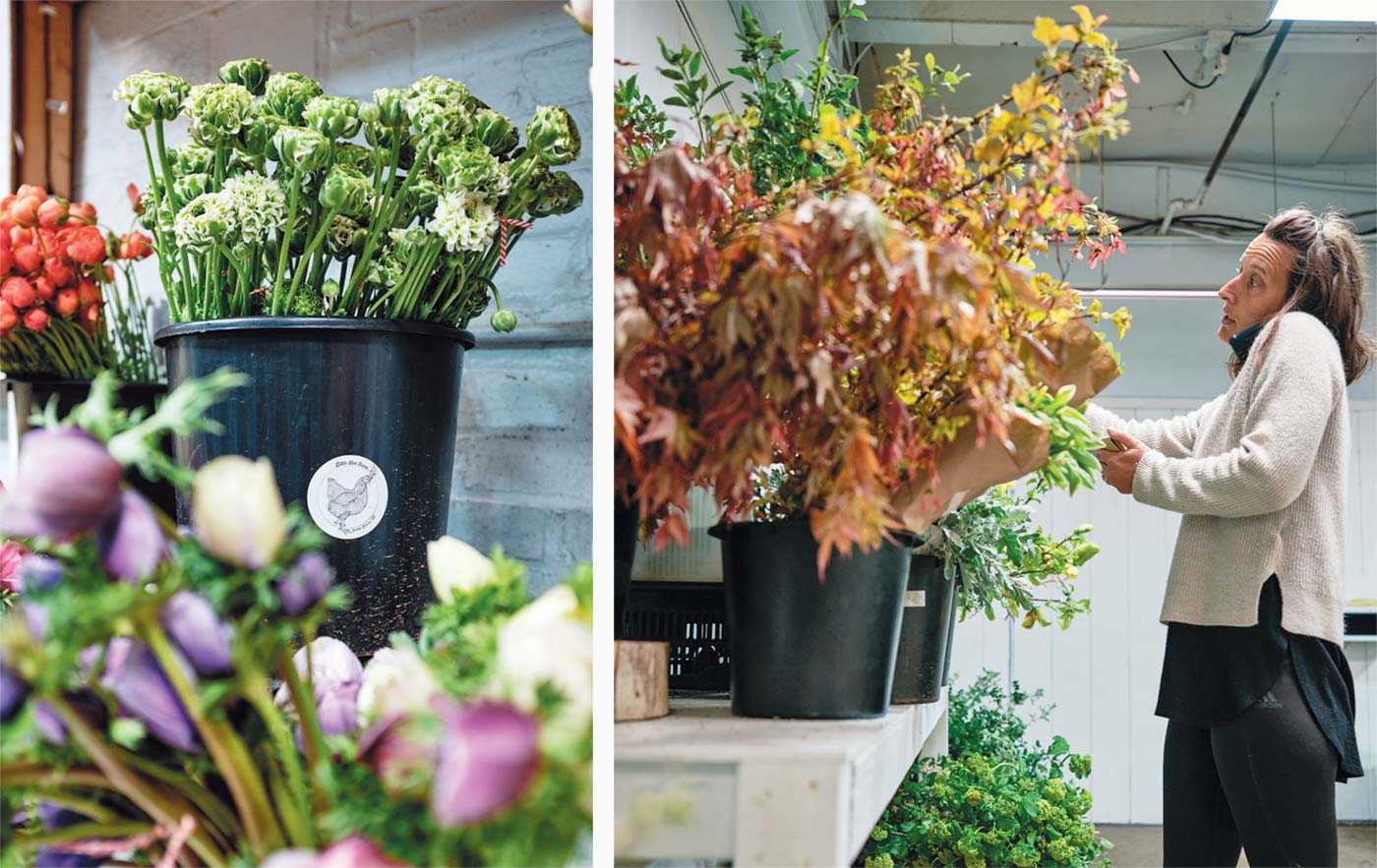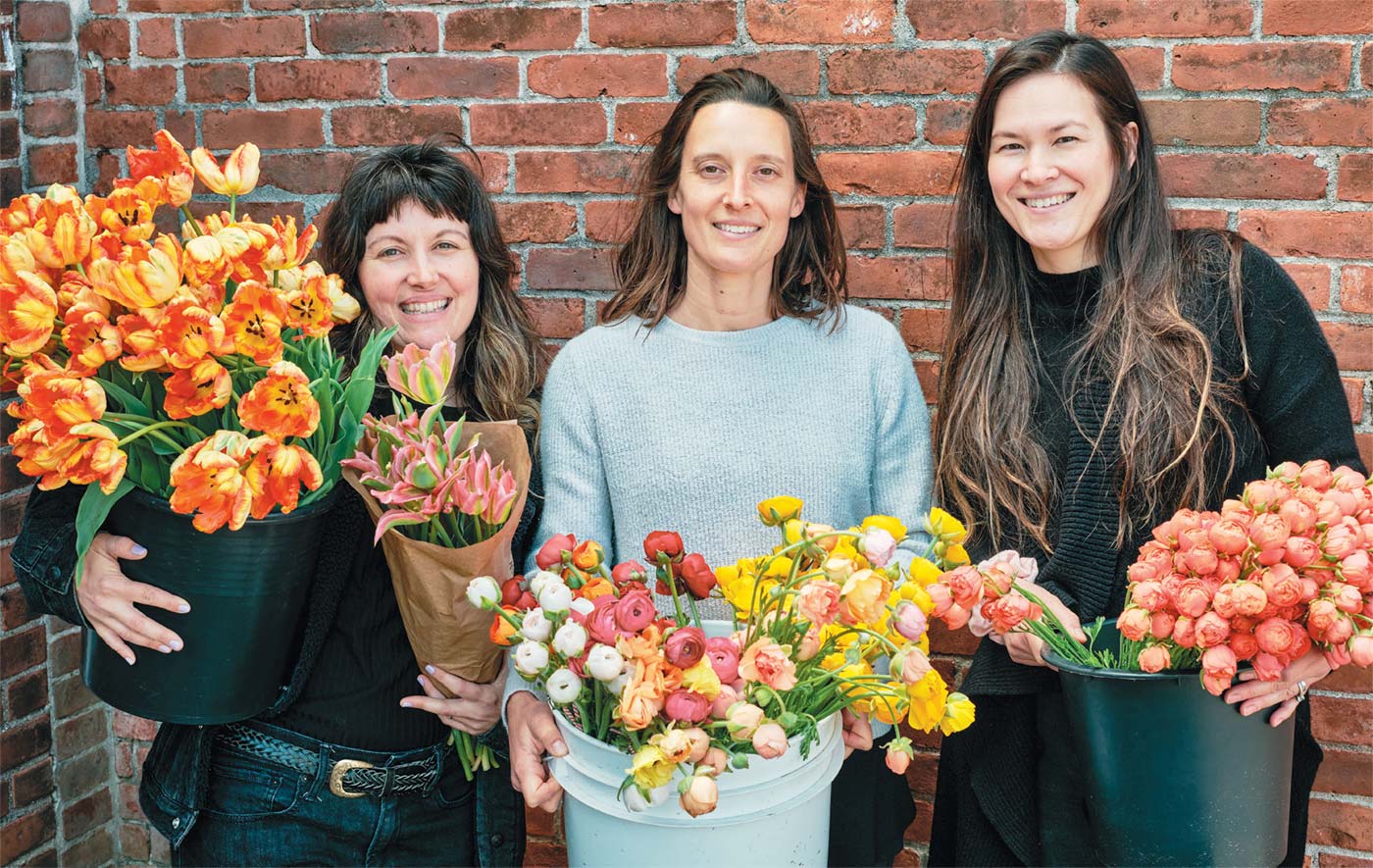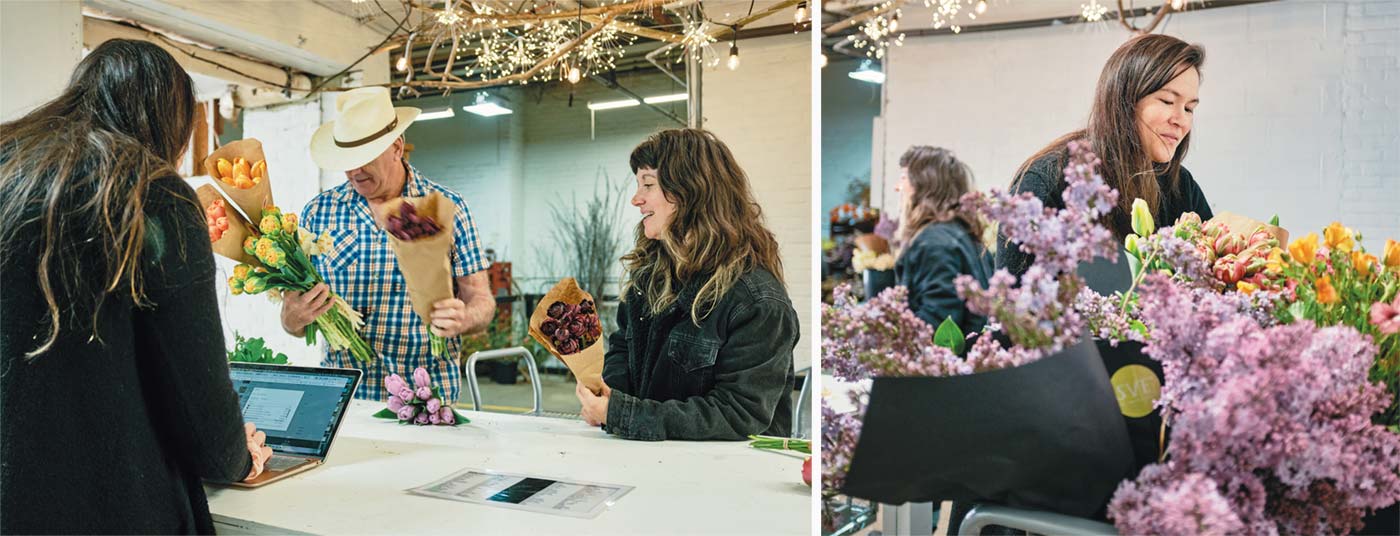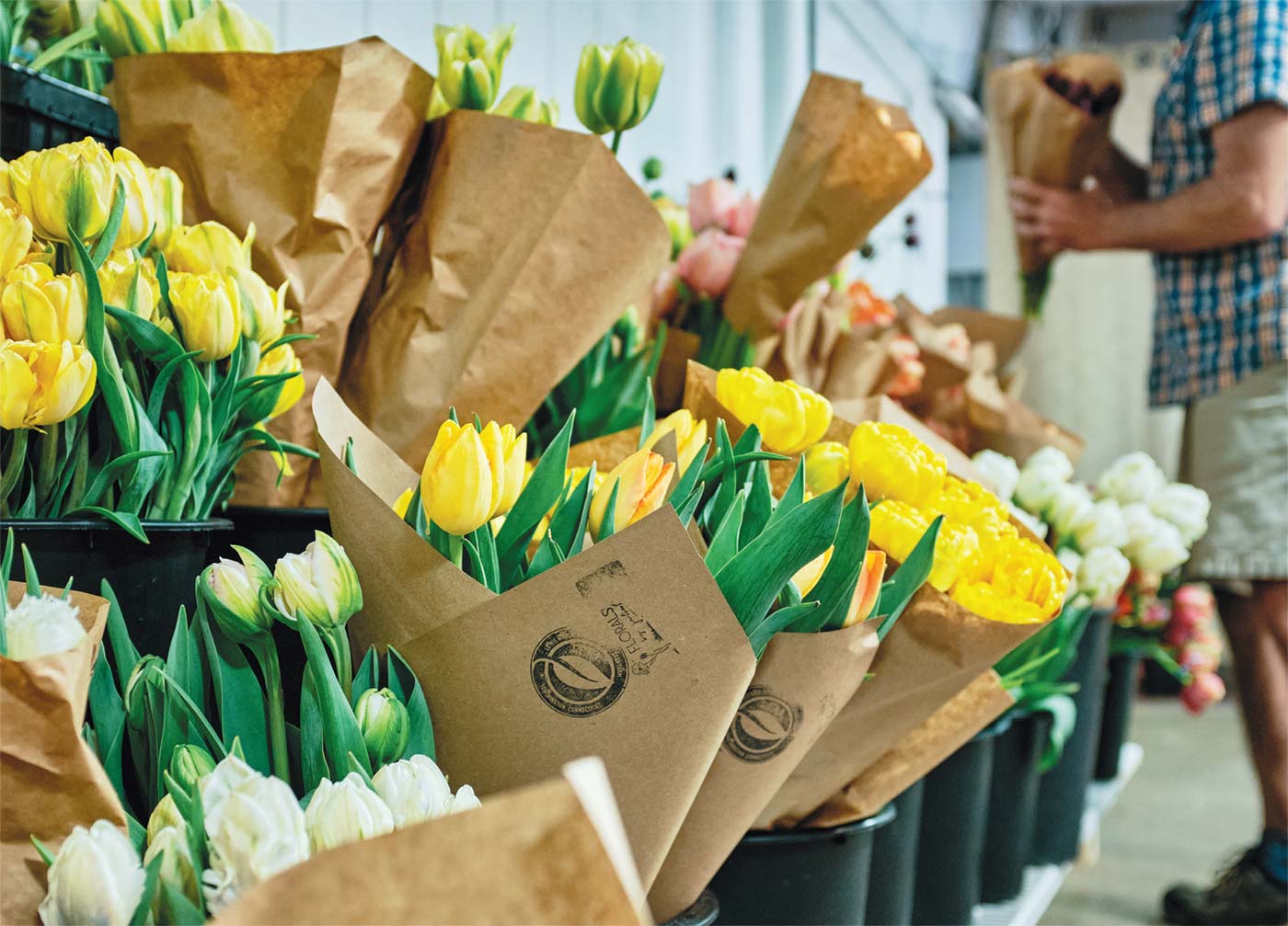There’s a Huge Revival in Locally Grown, Cut Flowers
Tucked away in an industrial section of downtown Meriden is a haven of vibrant natural beauty that blooms every Wednesday through Friday from April through December. Formerly located in Branford, the CT Flower Collective moved into its new location this spring, increasing their floor space from 1,000 to 4,000 sf. Now in its fourth year, this wholesale supplier of locally grown, cut flowers founded by Eddy Farm owner Haley Billipp and several other local flower farmers, is well, blossoming! While the urban setting isn’t exactly glamorous, once you step inside the one-story brick building, you’re absolutely overcome by a rich tapestry of exquisite color, fragrance, and organic shapes – all emanating from an astonishing array of cut flowers, stacked, piled, and bucketed. And importantly, all grown on farms from across our own tiny state.
In early May, I was greeted by the heavenly smell of lilac and narcissus, tulips in every shade of the rainbow, delicate jewel-toned anemone, feathery nigella, enormous amaryllis blooms, tall yellow foxglove stalks, and more. “Everything is awesome today!” Justine, a freelance florist who also teaches a design class at UConn, gushes to Haley as she pushes a metal cart around the market floor. Slim and energetic, Haley plucks flowers from buckets, gathering a pre-order phoned in that morning. She replies to Justine with equal enthusiasm: “I can’t believe the Ranunculus! I have SO much on my farm.”

(left) Ranunculus (Igloo) from Eddy Farm, one of many unusual varieties found at CT Flower Collective; (right) Haley multitasking
I couldn’t believe the Ranunculus either and impressed myself for recalling the name of this pretty bloom from my days working at a florist thirty years ago. Today, I learn this delicately ruffled, ball-shaped flower is grown right here in my home state and comes in shades from peach to coral to darkest aubergine to a variegated green and white form that looks like a tiny, frosted cup from which a fairy might drink.
I was even amazed at the greens arranged in black plastic flower buckets, waiting for a creative soul to snatch them up for some ethereal design. Silver dusty miller, pussy willow, branches of waxy pale yellow magnolia blossoms, and autumn olive, its tiny white flowers still furled tight. Who would have thought to use the branches of an invasive shrub as a cut flower? They were beautiful in that bucket and likely went on to grace a fabulous bouquet later that week.
“We are an exclusively local wholesale flower market,” Haley explains as she shows me around. The Collective is part of a movement in the American floral industry like the “Slow Food” movement, emphasizing local, seasonal, and sustainably grown products. According to Haley, 80-85% of cut flowers in the United States are imported. Most American flower growers that couldn’t compete with the low prices of huge, industrialized farms overseas went out of business in the 1980s.
Things are beginning to change, “There’s been a huge revival in locally grown, cut flowers,” says Haley. Just as we look locally for food, “Everyone now shops for flowers at farmer’s markets because they want to support local economies,” Haley says.
“Flowers from overseas have the most ridiculous carbon footprint - shipping, fertilizer, chemical fumigation at the border, all kinds of nasty things. Local flowers don’t have any of those.
“I can’t believe the Ranunculus! I have SO much on my farm,” says Haley. Cris elucidates, “This delicately ruffled, ball-shaped flower is grown right here in my home state and comes in shades from peach to coral to darkest aubergine to a variegated green and white form that looks like a tiny, frosted cup from which a fairy might drink.”

Jill Shea, Haley, and Denise Wilhem with tulips, spring bounty, & ranunculus.
We reduce waste in packaging and ask our growers to use paper rather than plastic sleeves. We try to reduce labor and materials cost for growers, which can be high. And we offer seasonal variety, far more diverse, interesting and, of course, fresher than the generic, imported carnations, mums, roses, and alstroemeria. Importantly, flowers that don’t ship well, such as super-trendy dahlias, are available in abundance from local growers!”
A fourth-generation farmer on her family’s 60-acre produce farm in Newington, Haley began farming 11 years ago. She soon became interested in growing flowers and reached out to the few growers she could find. There weren’t many. They were selling at farmer’s markets and wholesale to their local florists and designers. They were in random, sometimes hard-to-reach locations, and struggled to communicate the product they had available every week to their buyers. Building a wholesale client base was very challenging.
“Every time we got together, we chatted about what was hard,” Haley says. “We needed to figure out how to pool our resources. Florists interested in local flowers are a minority. There’s a convenience factor, so if the product is easy to access and is better quality, they’re interested from an artistic perspective. Finally, we just decided to do it,” she says. They started with ten growers of all sizes, from less than an acre of strictly flowers to large, diversified farms. They rented half of a flower shop in Branford and held a wholesale market one day a week. They quickly realized there was a big demand for their product.
Kristin Burrello of Muddy Feet Flower Farm is one of Connecticut’s OG local growers, according to Haley. “Back in the day, I would drive around the state to deliver flowers to a handful of designers and florists, or they would drive up to Ashford,” says Kristin. “I farm on a little more than one acre and coined the phrase 'boutique flower farm' because I grow small quantities of hundreds of varieties of flowers.” For about ten years, Kristin sold at Westport and Coventry Farmer’s Markets, sold wholesale bouquets to Terrain and White Flower Farm, and did wedding work for her own Farm Couture Flowers design business. Now, much of her product goes to the Collective, which encouraged her to seek out and grow unique or hard to grow varieties of flowers. “The Collective has helped opened up another sales channel that is less laborious than farmers markets or event work and is now a strong revenue source for my farm,” she says. “Most importantly, the Collective has fostered a supportive and like-minded community of flower lovers and growers. We all learn from each other, and I value the friendships that I have made.”
A huge upgrade for the Collective was discovering the on online sales platform, “Rooted Farmers,” which was developed by a fellow flower farmer from New Hampshire. After two years of messy spreadsheets, this technology was a game changer, allowing every stem from every grower to be listed and sold online. Each week, growers upload all their information, descriptions, pictures, price, and so on. There could be 50 pages of inventory. Then buyers go online and place orders to pick up the following week. Every Tuesday, farms bring their product to Meriden, located roughly in the middle of the state. “Some come from over hour away. This has allowed growers who are in really random places access to all these buyers in one place,” says Haley.

(left) From left: Denise checking out a buyer from Cynthia's Flower Shop while Jill assists; (right) Denise with lilacs from Scantic Valley Farm.
Haley finds the Collective to be a great business model. “We’re one of the older, more established cut flower collectives in New England,” she says. “When we first started there were just a handful across the country, but a lot have started up in the last two years.” Annual membership fees from growers are “seed” money. Buyers--which include flower shops, designers, caterers, wedding venues, bakeries, photographers, even other farms that want to supplement their CSAs--pay a much smaller annual fee. Growers receive 80% of their sales and the other 20% covers payroll, rent, and operational fees. Haley is looking forward when they can add more growers but there must be a balance with the number of buyers.
The Collective makes lots of deliveries but is known for floor sales, with an abundant variety of flowers on display that buyers can purchase to fill their business needs plus the creative fantasies inspired by fresh beauty seen in person. Most growers like to bring extra when they deliver pre-orders every Tuesday. This year the Collective opened to the public, a boon for both growers and non-member buyers. The Wednesday market is strictly wholesale but on Thursday and Friday the public can shop with a retail upcharge. Some walk-ins buy a few flower bunches for their homes, but others need flowers for DIY event arrangements, such as for baby or wedding showers. The Collective allows DIY buyers to make an appointment and give their preferences (color scheme, size, etc.), which is communicated to growers who can bring something relevant if they have it available.
After just four years, the CT Flower Collective now consists of 28 farms and over 150 buyers. “We took a big leap in growth this season by renting this large space and being open three days instead of one,” Haley says. The Collective now has the infrastructure, staff, and technology to support even more development. Haley would love to add more farms—they are out there---but only if there’s balance so that all growers in the Collective will succeed. “We can support a lot more buyers,” she says. “There are a lot of people out there who haven’t heard of us, who have no idea that there are local flower farms all across our country and almost 30 right here in Connecticut.”
- The CT Flower Collective is open Wednesday 8am-11am, and Thursday/ Friday 8am-10am. They are located at 5 Cross St, Meriden, CT. For more info, visit ctflowercollective.com.





